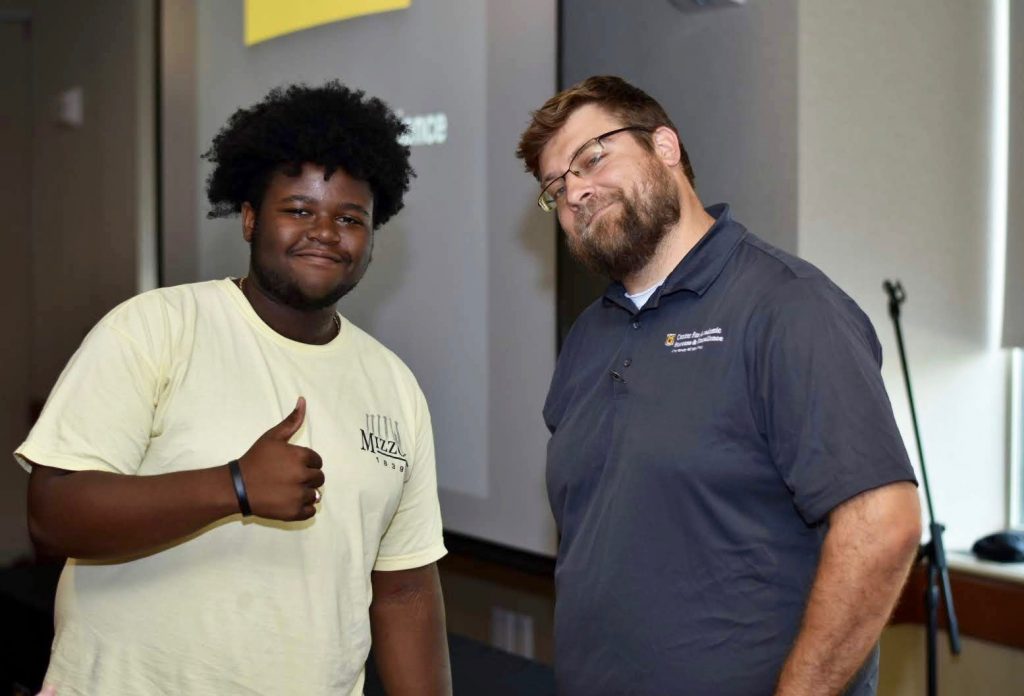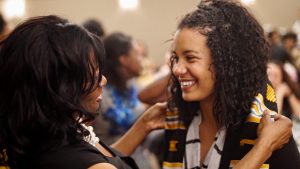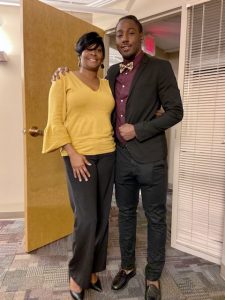Published on April 17, 2020

CASE Student Service Coordinator Justin Light with student during the 2019 Summer Bridge Program in Columbia, Missouri.
When people care about something, you can hear it in their voice.
If you were to speak to Justin Light or Devara Brock about the students, it’s clear that the care they have goes beyond the requirements of Student Service Coordinators for the Center for Academic Success & Excellence.
“I love my job,” Ms. Brock stated. “I’ve never been Monday to Friday 8 a.m. to 5 p.m. I do set boundaries with the scholars, but, right now, I just make myself available. I just want all of them to be successful and I want to help them get there. If I have to give wisdom, I’ll do that. If I have to give guidance — I’ll give a little nudge with that. I will always give love and encouragement and correction, when needed.”
“I really like my job,” Light said. “I tell people that every year I fall in love with it again. It is a very intense job. It is a job that demands a lot, but I’m very happy to do that because I’ve gotten to interact with some really phenomenal students, and I’m really happy to be a part of their journey and to help them as I can.”
Both Light and Ms. Brock help CASE students and scholars navigate through college. Nothing has showcased how much CASE coordinators support for their students like the COVID-19 pandemic.
“The most challenging part of all of this is that we just continue to not understand how COVID-19 works and that we were never in a position to be ready for this. I mean that not only as a Mizzou community or CASE but also just in a larger world perspective,” Light explained.
Caring for their students extends past the academic boundaries of college.

CASE Student Service Coordinator Devara Brock embracing Student Scholar at the 2018 Salute to Excellence in Columbia, Missouri.
“I’m always big on your wellbeing, mental and physical,” Ms. Brock stated. “So during this time, we stay positive. You take care of yourself mentally, emotionally, physically and financially. We just have to remember this is nothing we have control over. We can’t exert our energy on the pandemic because we can’t control it. I’m big on having a peace of mind and if they can continue to have a peace of mind, we can succeed through this. I tell them, we can’t stress because we have no control.”
When the COVID-19 pandemic led to the campus closure of MU, the students weren’t the only ones tasked with adapting to massive changes. The CASE staff was faced with similar transitions to online communication and work.
“I’ve actually struggled with it,” Light said. “I like the idea of the repetition of going to the office and seeing students kind of at random as they drop into the CASE space, so I’ve really struggled with that. It’s been difficult for me to find a level of productivity when I don’t get that boost from the students.”
“I do have a love for one-on-one interaction, but a lot of it doesn’t change besides the face-to-face,” Ms. Brock stated. “They still call, we do a lot of phone calls. I’m talking to them and processing them through things. They’ll be on their computer, and I’ll be on my computer, so we work through scheduling and their goals to get acclimated to this new normal. I just focus on being available, being a sounding board and helping them adjust.”
In addition to changing the way they meet with students, the coordinators have worked to provide other services remotely. From academic advising to tutoring, the CASE office has transformed how accessible they are to students.
“We’re trying to be more versatile in allowing students to access information that’s not necessarily directly linked to being able to sit down with one of our staff members at a specific time,” Light explained. “I think that’s going to change. My hope is that we create a library of resources that students can access basically any time. Our processes are going to look a little different, and that’s okay. That can be a really good thing, but it is an adjustment that we’re all going to have to make. As long as we can buy into making changes, I think we’re all going to be alright.”
Finding solutions to the problems posed by the pandemic is a matter of preparing for the future.

CASE Student Service Coordinator Devara Brock posing for a photo in her office with Student Scholar.
“There is still life after the pandemic. That’s what I’ve been telling everyone. We still plan accordingly. We are still moving forward and trying to change our mindset to online, remote and virtual classes. But don’t stop. The main thing is we can’t quit,” Ms. Brock explained.
Light shared the same sentiment, “They’re working towards a college degree and that, regardless of however long this thing lasts, we will still be in a position where people will be needed to solve problems. That’s primarily what our university is trying to arm our students for. Going to college is also about becoming a better critical thinker and evaluator of the world. It becomes even more important when we don’t know the answers that we need and we had no idea what the questions they have that are needing answers now.”
Despite the unprecedented challenges the MU community is facing, the CASE staff continues to care for the wellbeing of their students. Ms. Brock and Light represent what CASE strives for everyday in any circumstance: make sure students know they are not alone; they have a home and a support system at the university.